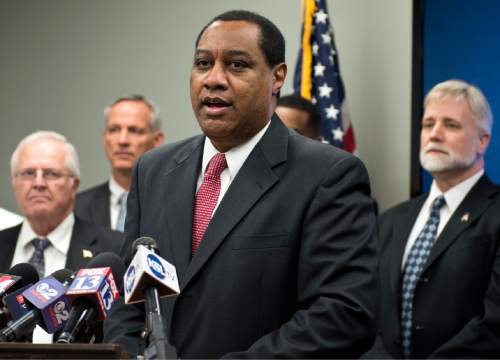This is an archived article that was published on sltrib.com in 2015, and information in the article may be outdated. It is provided only for personal research purposes and may not be reprinted.
The Utah Republican Party is asking the Lieutenant Governor's office to help hurry a dispute over how candidates are nominated to a court so a judge can rule on the matter because, as the party chairman put it, the top elections office is no longer an "honest broker" on the issue.
State GOP Chairman James Evans cited comments by Mark Thomas, the state elections director, in which he characterized as "crazy stuff" Evans' contention that the party can decide whether to let candidates gather signatures to get on the primary ballot.
"We have decided it is in the best interests of the party to not seek the [lieutenant governor's] interpretation of the law," Evans said. "Instead, we want to proceed to court for a determination since we have lost confidence that we would get a fair hearing and that the LG's office would be an honest broker."
Evans sent a letter to Lt. Gov. Spencer Cox on Tuesday evening, asking Cox's office for a detailed interpretation of its view of the law so it can potentially go back to court and ask a judge for a ruling on the matter. Thomas said the state would consider the request.
Cox's office has said they interpret the law to allow candidates seeking a party's nomination to either go before delegates at the party convention, as has traditionally been done, or to gather a required number of signatures on a petition to bypass the convention and secure a spot directly on the primary ballot.
But Evans and GOP attorneys contend that the bill lets the party choose how its candidates will be nominated — either through the convention, signature-gathering or both — and the Republican Party has chosen the convention.
GOP hopefuls who go the signature route, moreover, will be in violation of the party's rules and could be disqualified from the ballot.
The disagreement has left the leaders of the Republican Party at odds with the Republican lieutenant governor and many in the GOP-dominated Legislature, who believe their intent in crafting the dual-track system was clear.
Last week, Sen. Todd Weiler, R-Bountiful, sent a letter to the lieutenant governor, saying that he was planning to gather signatures and go to the party convention when he seeks re-election next year, and asked for a formal opinion on the disputed interpretation.
There is some urgency to resolve the situation because candidates can begin collecting signatures for the 2016 election after Jan. 1.
SB 54 was developed amid an effort by Count My Vote, a group led by former Gov. Mike Leavitt and others, to gather enough signatures to put a measure on the ballot that would end the convention system and replace it with signature-gathering and primary elections.
The group contended that the convention system put too much power in the hands of the delegates, discouraging many average Utahns from participating and producing candidates who do not represent the state's mainstream views.
The party did not take part in the negotiations and, after it passed, filed a lawsuit challenging the bill's constitutionality.
Earlier this month, U.S. District Judge David Nuffer struck down a provision that forced the parties to open their primary elections, saying forcing the parties to associate with unaffiliated voters violated the parties' First Amendment rights.
The judge left the remainder of the law untouched.
Twitter: @RobertGehrke



